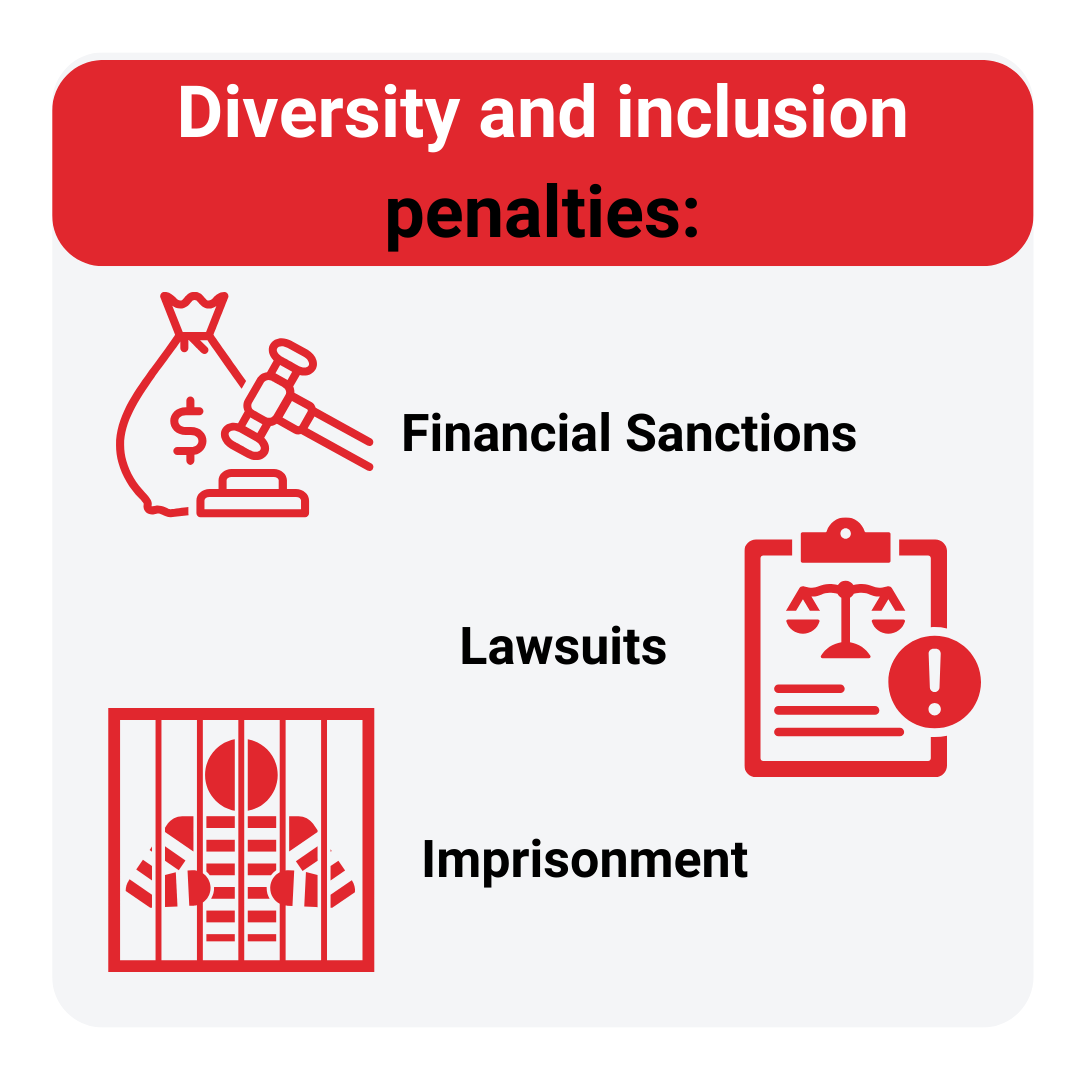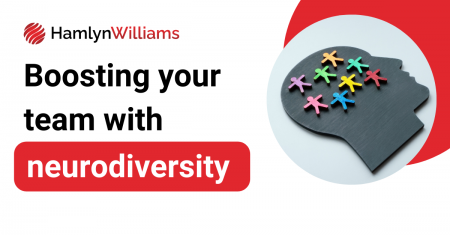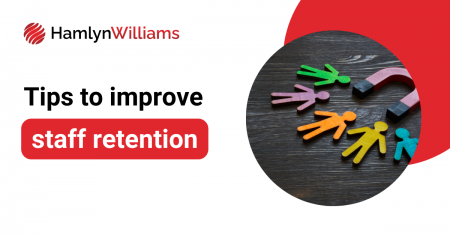Fostering diversity and inclusion isn't just a legal imperative, but it also offers a strategic advantage to your team. A workplace that embraces diversity also unlocks innovation, enhances creativity, and ultimately builds a stronger, more resilient team and culture.
However, overcoming ingrained and subconscious biases can be challenging. It requires a deliberate and collective effort to dismantle preconceptions. In this article, we'll explore actionable strategies to foster diversity and inclusion in the workplace, exploring why it is essential in securing success for your organisation.
What are the legal obligations towards diversity and inclusion?
Across the United States, the United Kingdom, and Europe in particular, there are a host of laws and regulations that address aspects of diversity and inclusion in the workplace. While these laws may cover different aspects of diversity, and compliance requirements can vary depending on the jurisdiction, they are in place to protect the workforce, ensure equality, and help strengthen cultural diversity.
Some of the laws impacting the United States are:
-
Equal Employment Opportunity Commission (EEOC)
The EEOC enforces federal laws that prohibit employment discrimination based on race, colour, religion, sex, national origin, age, disability, and genetic information. Employers are generally prohibited from discriminating against employees or job applicants based on these protected characteristics.
-
Title VII of the Civil Rights Act of 1964
Title VII prohibits discrimination based on race, colour, religion, sex, and national origin. It applies to employers with 15 or more employees, including private sector employers, state and local governments, and educational institutions.
-
Americans with Disabilities Act (ADA)
The ADA prohibits discrimination against individuals with disabilities and requires employers to provide reasonable accommodations for qualified individuals with disabilities. This means that employers must provide flexibility to adjust a job or the work environment to enable an applicant or employee with a disability to participate in the application process or to perform essential job functions.
-
Age Discrimination in Employment Act (ADEA)
The ADEA prohibits age discrimination against individuals who are 40 years of age or older. This can impact all areas of employment, from recruitment, training, or promotions, through to retirement, dismissal, or flexible working conditions.
-
Genetic Information Non-discrimination Act (GINA)
GINA prohibits the use of genetic information in employment decisions and restricts employers from requesting, requiring, or purchasing genetic information. It also prohibits any discrimination against an employee in regard to their compensation, terms, conditions, or privileges of employment, because of their genetic information.
Some of the laws impacting businesses operating in the UK include:
-
Equality Act 2010
The Equality Act is a comprehensive piece of legislation in the UK that protects individuals from discrimination based on a range of points. The act offers protection around discrimination against age, disability, gender reassignment, marriage and civil partnership, pregnancy and maternity, race, religion or belief, sex, and sexual orientation.
-
Public Sector Equality Duty (PSED)
Public authorities in the UK are subject to the PSED, which requires them to consider how their policies and practices impact equality and to actively promote equality. The equality objectives are designed to help eliminate discrimination, harassment, victimisation, and any behaviours prohibited under the Equality Act 2010.
-
Gender Pay Gap Reporting
In the UK, certain employers are required to report their gender pay gap, providing transparency on the differences in pay between male and female employees. Any employer with 250 or more employees (on a specific date each year) must report and publish their gender pay gap information.
-
Equal Opportunity Policies
Many organisations in the UK implement specific policies and practices to promote diversity and inclusion. While not required by law, such initiatives are encouraged as part of good employment practices. Many companies will publish an EOP to help provide transparency and accountability, to their company. The policy will outline what constitutes fair treatment and what is considered discrimination, abuse, and harassment.
In Europe, there are both European laws, and individual state laws to consider. These can include:
-
Racial and Ethnic Equality Directive (2000/43/EC)
This directive, designed to fight against racism and xenophobia, prohibits discrimination on the grounds of racial or ethnic origin in employment, education, social protection, and access to goods and services.
-
Gender Equality Directive (2006/54/EC)
The Gender Equality Directive addresses gender equality in the workplace, covering areas such as recruitment, pay, working conditions, and promotion opportunities.
-
Equal Treatment Directive (2006/54/EC)
The European Parliament and Council of the EU have another directive that addresses discrimination on various grounds, including religion or belief, disability, age, and sexual orientation, with a focus on equal treatment in employment and occupation.
-
EU Charter of Fundamental Rights
The Charter includes provisions related to non-discrimination, equality, and the rights of individuals in various areas, including employment. The charter also provides protection to prevent exploitation in the workplace, as well as affording the right to the same working conditions for nationals of third countries working in the EU.
While having to abide by EU rules, each EU member state may also have its own laws and regulations addressing diversity and inclusion. Employers in each country are responsible for upholding the specific legislation of the individual countries they operate in, as well as EU laws. For example, Germany has a country-specific law, the General Act on Equal Treatment (AGG) which is designed to stop discrimination on the grounds of race or ethnic origin, gender, religion or belief, disability, age or sexual orientation.
.png)
The cost of discrimination
It's essential for employers to be aware of and comply with these laws and regulations to ensure a fair and inclusive workplace. Because of the stringent laws, and the penalties in place for those who fall short of the required standards, many companies will adopt their own internal policies and practices that go beyond the legal requirements to ensure compliance and create a more diverse and inclusive organisational culture.
Non-compliance with anti-discrimination laws in the United States can result in significant penalties for employers. The Equal Employment Opportunity Commission (EEOC) has the authority to investigate complaints and may initiate legal action against employers found to be in violation. Penalties may include fines, compensatory and punitive damages, and injunctive relief. The severity of penalties depends on factors such as the nature and extent of the discrimination, the size of the employer, and whether the violation is deemed intentional. In some cases, individuals who have experienced discrimination may file lawsuits seeking remedies such as back pay, reinstatement, or other forms of relief.
In the UK, the penalties for non-compliance with equality laws, primarily outlined in the Equality Act 2010, can include financial sanctions, compensation orders, and, in some cases, imprisonment. Employment tribunals have the authority to hear discrimination cases, and if an employer is found to have unlawfully discriminated against an employee, they may be required to pay compensation to the affected individual. The Equality and Human Rights Commission (EHRC) in the UK also has enforcement powers, including the ability to issue compliance notices and undertake investigations. Failure to comply with gender pay gap reporting requirements can result in reputational damage, public scrutiny, and potential fines.
Penalties for non-compliance with anti-discrimination laws in Europe can vary by country but European Union member states are bound by the EU's anti-discrimination directives, and penalties for non-compliance may include fines and other sanctions. National equality bodies in each country are often responsible for enforcing these directives. Individuals who experience discrimination may pursue legal action through national courts and due to this the specific penalties and enforcement mechanisms can differ, but the overarching aim is to ensure that employers adhere to anti-discrimination laws and promote equality in the workplace.

Avoiding discrimination – the challenge of unconscious bias
Unconscious bias can pose a significant challenge in the hiring process as it can inadvertently lead to discrimination, undermining the essential principles of fairness, equality, and diversity. Unconscious biases are deeply ingrained attitudes or stereotypes that individuals may hold unconsciously, often influenced by societal norms, cultural conditioning, or personal experiences. When left unexamined, these biases can subtly influence decision-making, including hiring decisions, and can therefore perpetuate systemic inequalities within the workplace.
In the context of hiring, unconscious bias can manifest in various forms. For instance, in-house hiring managers may unknowingly favour certain candidates who share similar backgrounds or characteristics as existing team members, leading to a lack of diversity within the organisation. Common biases include affinity bias, where individuals gravitate towards those who resemble them, and confirmation bias, where pre-existing beliefs influence how information is interpreted to align with those beliefs.
These biases can result in discriminatory practices, as qualified candidates from underrepresented groups may be overlooked in favour of those who align more closely with the unconscious biases of decision-makers. This not only hinders diversity and inclusion efforts but also diminishes the potential for innovation and creativity that arises from a diverse workforce.
.png)
Addressing unconscious bias in hiring requires proactive measures, such as implementing blind recruitment processes, offering diversity training to hiring managers, and utilising diverse interview panels. Creating awareness about unconscious biases is crucial for fostering a fair and inclusive hiring environment, ensuring that decisions are based on merit and skills rather than unintended and often subtle prejudices. By acknowledging and actively mitigating unconscious biases, organisations can strive towards building diverse, equitable, and thriving workplaces. Using external recruitment companies is often a first choice for those companies who actively are looking to encourage diversity while negating any unconscious biases. Using a third party to support a company’s scaling or hiring needs also offers another layer of protection from legal action regarding diversity and inclusion within the hiring process.
The benefits of a diverse team
While a diverse team is perhaps obviously more beneficial than a team of similar, and similarly experienced, people, it can benefit the wider organisation and community too. Here are some of the benefits you can expect to see from a more diverse team:
-
Enhanced Creativity and Innovation – a diverse and inclusive team brings together individuals with varied backgrounds, experiences, and perspectives. This diversity fosters a rich tapestry of ideas, which can spark creativity and innovation. With different people comes different perspectives – which in turn can provide fresh insight and alternative solutions. When team members approach challenges from different angles, they can collectively develop innovative solutions that may not have been possible in a more homogenous setting.
-
Improved Decision-Making – diverse teams benefit from a wider range of viewpoints and insights, leading to more thorough and well-rounded decision-making processes. By considering a wider range of perspectives, teams can identify potential blind spots, anticipate more potential challenges, and make more informed choices. This diversity of thought enhances the overall quality and effectiveness of decision-making within the organisation and can help troubleshoot or even help avoid, issues before they arise.
-
Broader Talent Pool and Recruitment Success – a commitment to diversity attracts a broader range of talents and skills during the recruitment process. When companies prioritise inclusivity, they are more likely to appeal to candidates from different demographic backgrounds. This not only expands the talent pool but also contributes to a positive employer brand, making the organisation more attractive to individuals seeking an inclusive and welcoming work environment.
-
Increased Employee Engagement and Satisfaction – inclusive teams create a sense of belonging and value among employees, fostering higher levels of engagement and job satisfaction. When individuals feel that their unique contributions are recognised and appreciated, they are more likely to be motivated, committed, and collaborative. This positive work environment contributes to employee retention and overall team cohesion.
-
Enhanced Global Competitiveness – in an increasingly interconnected world, diversity is a strategic asset for organisations competing on a global scale. A diverse team is better equipped to understand and navigate diverse markets, cultural nuances, and customer needs. This cultural intelligence enhances a company's ability to adapt to changing demographics and consumer preferences, ultimately contributing to its global competitiveness and success.
How to make your team more diverse
Diverse teams bring together a range of perspectives, skills, and experiences, fostering creativity, innovation, and adaptability. Embracing diversity not only enhances problem-solving but also creates a dynamic workplace leading to improved decision-making and overall organisational success.
A commitment to diversity starts at the top. Leadership should actively promote and embody an inclusive culture, setting the tone for the entire company. For those in the management team, you should encourage open communication and celebrate the unique perspectives each team member brings to the table. Implementing policies that embrace and support diversity, such as flexible work hours, remote work options, and parental leave, will demonstrate to your employees that you are actively accommodating diverse needs and create an environment where every employee feels valued.
Hiring managers need to create a recruitment strategy that actively seeks diversity. Take time to review your hiring processes to ensure they are inclusive and free from bias or reach out to a recruitment company who can take the hard work out of it for you. By establishing partnerships with recruitment agencies and universities, you can easily widen your talent pool.
By educating your team about the importance of diversity you can further improve the consciousness of inclusion across your wider company. Regular training sessions that address unconscious bias, cultural competence, and microaggressions will help to promote a learning environment where employees feel empowered to ask questions and engage in meaningful conversations. Leadership development programs will ensure you leaders are equipped with the skills to manage diverse teams effectively, fostering an environment where every voice is heard and valued.
Encourage your business leaders to celebrate the diversity in their own teams too. By creating opportunities to do this, such as recognising cultural holidays, participating in diversity events, and showcasing success stories that highlight the positive impact of diversity within the organisation, you will also create a culture of support and celebration which will also help with long-term retention.
Remember
Fostering diversity and inclusion in the workplace is not only a legal requirement but can also significantly benefit your team and organisation as a whole. The numerous laws and regulations in the United States, the United Kingdom, and Europe underscore the importance of creating an equitable work environment. Non-compliance can lead to severe penalties, emphasising the need for employers to not only adhere to legal requirements but also adopt internal policies that surpass these standards, creating a more inclusive organisational culture.
The challenge of unconscious bias in the hiring process further raises the importance of proactive measures. Unconscious biases, if left unchecked, can inadvertently lead to discrimination, hindering diversity and inclusion efforts and limiting the full potential of a diverse workforce. Implementing blind recruitment processes, using an external recruitment company, offering diversity training to existing employees, and using diverse interview panels are essential steps toward mitigating these biases and fostering a fair and inclusive hiring environment.
The benefits of a diverse team are extensive and extend beyond the immediate workplace. Enhanced creativity, improved decision-making, a broader talent pool, increased employee engagement, and enhanced global competitiveness are all tangible advantages that contribute to organisational success. To make your team more diverse, leadership commitment, inclusive policies, strategic recruitment, education, and celebration of diversity are crucial steps. By embracing diversity, you can create dynamic, innovative, and adaptable teams that not only excel internally but also contribute to a positive societal impact.
If you want to find out how we can help you scale your team while overcoming unconscious bias and the many laws impacting employment, head to the Hamlyn Williams contact page to get in touch.


















